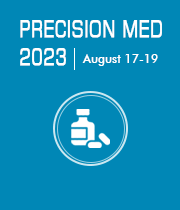Biomarkers and Diagnostics
Healthcare is changing, and it's critical to take use of new technology to generate fresh data and assist the adoption of precision medicine (PM). Biomarkers are increasingly being used in clinical trials to enhance patient outcomes, and they are quickly becoming ubiquitous in clinical practice. A diagnostic biomarker is a biological parameter that can be used to help diagnose a disease and may also be used to predict disease progression and treatment success. A laboratory, radiological, genetic, anatomical, physiological, or other finding that aids in the differentiation of one disease from another. The pharmaceutical industry's high failure rate has pushed biomarkers and personalized medicine to the forefront as potential answers. Biomarkers and companion diagnostics (CDx) have the potential to help the pharmaceutical business increase the likelihood of success, shorten time to market, and, most significantly, improve patients by enabling accurate diagnosis and selection of the most effective and least toxic therapeutics.
- In-Vitro Diagnostics
- Qualitative Biomarkers
- Quantitative Biomarkers
- Rare Disease Biomarkers
- Clinical Validation of Biomarkers
- Biomarkers for Detection Of COVID-19
- Challenges and Solutions for Cancer Biomarkers
- Diagnostic Biomarkers
- Analytical Biomarkers
- Digital Biomarkers
- Prognostic Biomarker
- Predictive Biomarker

Bernd Blobel
University of Regensburg, Germany
Roy Gary Beran
University of New South Wales, Australia
Matthias Schwab
University of Tubingen, Germany
Thomas Webster
Interstellar Therapeutics, United States
Boris Tankhilevich
Magtera, Inc., United States
Isabella Friis Jorgensen
University of Copenhagen, Denmark


Title : The use of anti seizure medication therapeutic blood level determination to personalise the treatment of epileptic seizures especially in patients attending the accident and emergency department
Roy Gary Beran, University of New South Wales, Australia
Title : Personalized and precision medicine (PPM) can be established as a unique healthcare model through biodesign-driven and inspired biotech, translational applications. This approach aims to ensure human healthcare, wellness, and biosafety.
Sergey Suchkov, Institute for Biotech & Global Health of RosBioTech and A.I. Evdokimov MGMSU, Russian Federation
Title : Monitoring folds localization in ultra-thin transition metal dichalcogenides using optical harmonic generation
Ahmed Raza Khan, Australian National University, Australia
Title : A systematic review of regulatory approaches for Direct- To- Consumers (DTC) genetic testing
Kavitha Palaniappan, Duke-NUS Medical School, Singapore
Title : Regulatory framework of in vitro diagnostic and artificial intelligence for precision medicine
Pei Ting Sarah Chou, Regulatory Affairs Professionals Society, Taiwan
Title : Unraveling cancer stem cell signatures in circulating tumor cells of metastatic colorectal cancer: Investigating ALDH1A1 and the repurposing potential of disulfiram via scRNA-seq
Nurul Syakima Ab Mutalib, Universiti Kebangsaan Malaysia, Malaysia